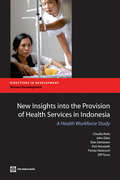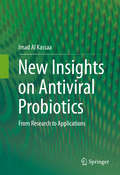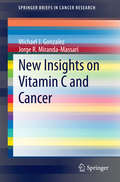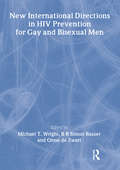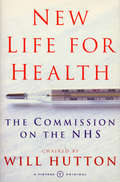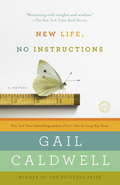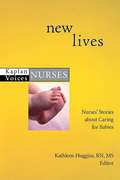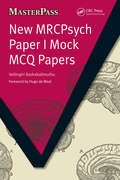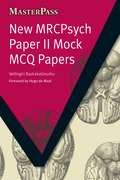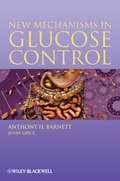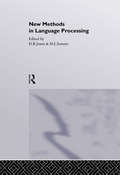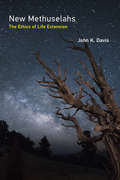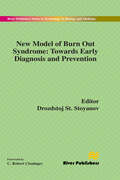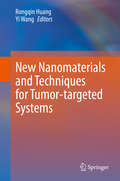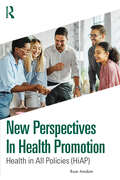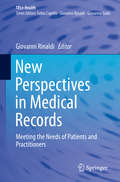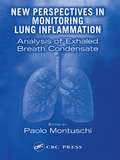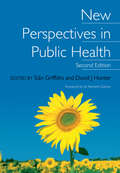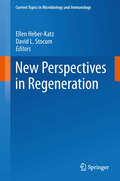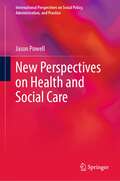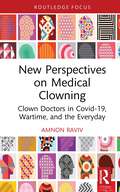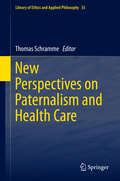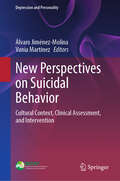- Table View
- List View
New Insights into the Provision of Health Services in Indonesia: A Health Work Force Study
by Claudia Rokx John Giles Puti Marzoeki Pandu Harimurti Elif Yavuz Elan SatriawanOver the past decade, Indonesia has implemented significant health sector reforms that include decentralizing responsibilities for service delivery, designing incentives for health providers, increasing the supply of midwives in remote areas, and analyzing demographic and epidemiological transitions causing changes in the patterns of disease prevalence. Financial protection against catastrophic expenditures has improved substantially, and legislation has been enacted to improve the quality of physician training and patient care. Despite the progress, substantial challenges remain and include comparatively low resources for the health sector, limitations in the supply of providers at the primary and hospital levels, inefficient payment systems, shortcomings in the quality of maternal and child and adult care, lack of oversight and effective licensing in an expanding private health sector, and ineffective planning for and recruitment and retention of health workers. Given the slow pace in improving health outcomes and limited evidence linking health performance and the health workforce, the need to make more information available about past experiences to inform future policy changes is pressing. Few studies have been undertaken to measure the actual impact of the reforms and the remaining challenges. 'New Insights into the Provision of Health Services in Indonesia: A Health Workforce Study' begins the process, providing real time evidence-based inputs to facilitate the Government of Indonesia's comprehensive health sector review. The authors' analysis of panel data from households and health providers will assist the government's assessment of the impact of past health work force policies and its consideration of policy changes.
New Insights on Antiviral Probiotics
by Imad Al KassaaThis book focuses on probiotics with antiviral activities. The "antiviral probiotic" is a new concept in medical sciences. Recently, studies have shown that antiviral probiotics can fight or prevent viral infections in many ways. The immunomodulation of mucosal immunity, production of antiviral compounds, virus trapping and the use thereof as vaccination vectors are the principal modes of action of antiviral probiotics. The author dedicates an entire chapter of the book to discussing the methods and techniques used to assess the antiviral activity of probiotic strains and their metabolites.
New Insights on Vitamin C and Cancer
by Michael J. Gonzalez Jorge R. Miranda-MassariResearch on vitamin C and its effects on cancer is growing in popularity around the world as positive research continues to accumulate building a stronger case for its effectiveness. This concise SpringerBrief on Vitamin C and Cancer presents the latest findings on how vitamin C induces apoptosis. A high concentration of vitamin C allows for ascorbate to generate hydrogen peroxide in tissue that can selectively kill cancer cells. Research has confirmed that high-dose vitamin C is cytotoxic to a wide variety of cancer cell lines, and that it also boosts the anti-cancer activity of several common chemotherapy drugs. Vitamin C also does more than just kill cancer cells. It boosts immunity by stimulating collagen formation to help the body wall off the tumor. It inhibits hyaluronidase, an enzyme that tumors use to metastasize and invade other organs throughout the body. This concise and up-to-date Brief is geared towards cancer researchers and scientists, as well as physicians interested in the basic science and the translational potential of vitamin C in cancer therapeutics.
New International Directions in HIV Prevention for Gay and Bisexual Men
by Michael Wright B R RosserIt is widely recognized that current HIV intervention models are falling short of their goals. What are the alternatives?To answer this question, New International Directions in HIV Prevention for Gay and Bisexual Men presents a collection of articles from European and American authors that rival dominant paradigms of HIV prevention. Researchers, practitioners, and community organizations will be challenged to examine current assumptions and to consider neglected aspects of risk behavior such as love, trust, and the dynamics of sexual intimacy. New International Directions in HIV Prevention for Gay and Bisexual Men explores models and theories that will help you develop more effective HIV prevention programs to better serve patients and clients.New International Directions in HIV Prevention for Gay and Bisexual Men offers you fresh perspectives on prevention work by examining risk behaviors in the interactional, communal, and social contexts in which they are practiced. You will receive alternative explanations and reasons for HIV risk that go beyond current approaches and that introduce possibilities for new intervention strategies. Written by experts in the field, the chapters in New International Directions in HIV Prevention for Gay and Bisexual Men will give you insight into new ideas and developments, including: placing a greater emphasis on improving successful risk management strategies as opposed to quantifying risk factors examining the meaning and context of sexual acts which occur in casual encounters or steady partnerships and incorporating their relevancy into prevention work considering the effects that cultural context and socially constructed meanings have on prevention work and incorporating individuals’values and feelings into prevention strategies focusing on more realistic goals of harm reduction that take sexual decision making into consideration as opposed to expecting abstinence relating the various aspects of sexual encounters--physical attraction, intimacy, reciprocity, and power--to reasons why men choose not to use condomsExamining how gay men can underestimate the risk of HIV in order to meet needs of intimacy, New International Directions in HIV Prevention for Gay and Bisexual Men will help you understand the symbolic dimension of sexual contact. The normal, everyday reasons for having sex without a condom are explored, questioning models which often characterize unprotected sex as being the result of low self-esteem, substance abuse, or some other psychological vulnerability. Presenting data from both qualitative and quantitative research conducted at group and individual levels, this book reveals the complexity of risk behavior, the richness of sexual experience, and the importance of respecting the unique context in which gay men live their sexual lives. New International Directions in HIV Prevention for Gay and Bisexual Men will help you understand this point of view, enabling you to provide patients and clients with more effective HIV prevention and risk management services.
New Life For Health: The Commission on the NHS chaired by Will Hutton
by Will HuttonThe National Health Service is Britain's greatest and most prized national institution. Ever since it's foundation the NHS has commanded extraordinary popular affection and loyalty. Its medical and non-medical staff force alike has been strongly committed to its success and values. However, now more than fifty years later, a huge gap has developed between what the NHS is able to deliver and the expectations and the needs of its users. The deterioration of the NHS dominates our news headlines today. In 1999 the Association of Community Health Councils for England and Wales established a Commission, chaired by Will Hutton, to examine the issue of the public interest and accountability of the NHS. The Commission's report has come up with some radical reforms that will transform the accountability of the NHS and will help rebuild the relationships between patients, doctors and NHS staff on a new basis of openness and trust.
New Life, No Instructions
by Gail CaldwellThe Pulitzer Prize winner and New York Times bestselling author of Let's Take the Long Way Home now gives us a stunning, exquisitely written memoir about a dramatic turning point in her life, which unexpectedly opened up a world of understanding, possibility, and connection. New Life, No Instructions is about the surprising way life can begin again, at any age. "What do you do when the story changes in midlife? When a tale you have told yourself turns out to be a little untrue, just enough to throw the world off-kilter? It's like leaving the train at the wrong stop: You are still you, but in a new place, there by accident or grace, and you will need your wits about you to proceed. "Any change that matters, or takes, begins as immeasurably small. Then it accumulates, moss on stone, and after a few thousand years of not interfering, you have a glen, or a waterfall, or a field of hope where sorrow used to be. "I suppose all of us consider our loved ones extraordinary; that is one of the elixirs of attachment. But over the months of pain and disrepair of that winter, I felt something that made the grimness tolerable: I felt blessed by the tribe I was part of. Here I was, supposedly solo, and the real truth was that I had a force field of connection surrounding me. "Most of all I told this story because I wanted to say something about hope and the absence of it, and how we keep going anyway. About second chances, and how they're sometimes buried amid the dross, even when you're poised for the downhill grade. The narrative can always turn out to be a different story from what you expected." Advance praise for New Life, No Instructions "New Life, No Instructions is beautifully written, lucid, and wise. We come of age again and again during the course of our lives, and need those who have traveled the path before us to shine a light, to lend a hand. Caldwell's story is moving and gripping. I found myself feeling that I had indeed been given a valuable set of instructions for how to proceed with eyes and heart wide open."--Dani Shapiro, author of Devotion and Slow Motion "In Gail Caldwell's New Life, No Instructions we see a Pultizer Prize winner once again go out and earn the title. It is a meditation on how seemingly faint winds can blow us wildly off course; on how spending time with a beloved animal can benefit our basic humanity; and on what it means to overcome, at middle age, a multitude of blows. It is lyrical and smart and triumphant and you won't read a more honest memoir in your life."--Darin Strauss, author of Chang and Eng and Half a Life Praise for Let's Take the Long Way Home "A near-perfect memoir: beautiful, humble, intimate and filled with piercing insights."--Time (Top 10 Nonfiction Book of 2010) "Stunning . . . gorgeous . . . intense and moving . . . a book of such crystalline truth that it makes the heart ache."--The Boston GlobeFrom the Hardcover edition.
New Lives
by Kathleen HugginsIn riveting first-person narratives focused on the first 28 days of an infant's life, nurses remember the babies they've delivered and cared for. In turns joyous, humorous, and heartbreaking, these stories from neonatal and perinatal nurses, midwives, labor & delivery nurses, pediatric nurses, and others tell what it's like to care for these small wonders at the starts of their lives.Edited and introduced by a registered nurse, the book is a resource for both nurses and anyone who is fascinated by their extraordinary stories.
New MRCPsych Paper I Mock MCQ Papers (MasterPass)
by Vellingiri Badrakalimuthu Gill TowsonThe Royal College of Psychiatrists has recently changed the format of its membership examination to adopt multiple choice questions (MCQs). This book of mock MCQ papers includes 675 questions and answers covering all subjects of the Paper I curriculum. It is an essential aid for all candidates preparing for the MRPsch Paper I, and will also be usefil for those revising for the similarly-themed Paper II and Paper III examinations.
New MRCPsych Paper II Mock MCQ Papers (MasterPass)
by Vellingiri BadrakalimuthuThe Royal College of Psychiatrists has recently changed the format of its membership examination to adopt multiple choice questions (MCQs). The book of mock MCQ papers includes 650 questions and answers covering all subjects of the Paper II curriculum. It is an essential aid for all candidates preparing for the MRCPsych Paper II, and will also be useful for those revising for the related Paper I and Paper III examinations.
New Mechanisms in Glucose Control
by Jenny Grice Anthony H. BarnettNew Mechanisms in Glucose Control presents a clear overview of the new drugs and treatment therapies that have been developed in recent years to help improve glycaemic management for the diabetic patient, namely the incretin mimetics (GLP-1 agonists) and DPP-4 inhibitors. It also considers other drug classes currently in development and undergoing clinical trials including the SGLT2 inhibitors and other pipeline products. In addition to pharma cotherapeutic agents, the role of bariatric as a management tool for diabetes is covered as well as consideration of the organisation of diabetes care with a community focus. This indispensable pocketbook details the newer treatments and offers a comparison with more traditional agents including sulphonyureas, glitazones and insulin. The pros and cons of traditional therapies are discussed as well as the epidemiology and pathogenesis of type 2 diabetes, helping to give the reader a better understanding of the disease area and its management. New Mechanisms in Glucose Control is essential reading for health professionals working in primary or secondary care and involved in treating diabetic patients.
New Methods In Language Processing
by H. L. Somers D. B. JonesStudies in Computational Linguistics presents authoritative texts from an international team of leading computational linguists. The books range from the senior undergraduate textbook to the research level monograph and provide a showcase for a broad range of recent developments in the field. The series should be interesting reading for researchers and students alike involved at this interface of linguistics and computing.
New Methuselahs: The Ethics of Life Extension (Basic Bioethics)
by John K. DavisAn examination of the ethical issues raised by the possibility of human life extension, including its desirability, unequal access, and the threat of overpopulation. Life extension—slowing or halting human aging—is now being taken seriously by many scientists. Although no techniques to slow human aging yet exist, researchers have successfully slowed aging in yeast, mice, and fruit flies, and have determined that humans share aging-related genes with these species. In New Methuselahs, John Davis offers a philosophical discussion of the ethical issues raised by the possibility of human life extension. Why consider these issues now, before human life extension is a reality? Davis points out that, even today, we are making policy and funding decisions about human life extension research that have ethical implications. With New Methuselahs, he provides a comprehensive guide to these issues, offering policy recommendations and a qualified defense of life extension. After an overview of the ethics and science of life extension, Davis considers such issues as the desirability of extended life; whether refusing extended life is a form of suicide; the Malthusian threat of overpopulation; equal access to life extension; and life extension and the right against harm. In the end, Davis sides neither with those who argue that there are no moral objections to life enhancement nor with those who argue that the moral objections are so strong that we should never develop it. Davis argues that life extension is, on balance, a good thing and that we should fund life extension research aggressively, and he proposes a feasible and just policy for preventing an overpopulation crisis.
New Model of Burn Out Syndrome: Towards Early Diagnosis and Prevention
by Drozdstoy St. StoyanovThis book is based on our most recent investigations revealing the complexity of the determinants of burn out in different populations at risk (health care professions, teachers, social workers etc.). Based on our empirical study we have developed a model of vulnerability to burn out which explains it as a specific complementary interaction between certain personality profile and the psychological climate at work place. In the course of evaluation there have been employed different inventories which are now validated as an assessment battery in about 300 subjects. Temperament and Character Inventory (revised) has been exclusively standardized for Bulgarian population as well Although burn out syndrome (BOS) is thoroughly discussed in modern literature, the present proposal is unique in the following aspects:It emphasizes the role of personality profiling understood as complementary construct to the dimensional measures of psychological climate. In this way the authors challenge traditional views of BOS as systematic phenomenonThis book aims at establishment of the vulnerability to BOS (proneness) as well as to revealing of the protective factors and therefore to underpin early diagnosis and prevention programs.Our book brings together several perspectives: the clinical (psychological and psychopathological) with the management perspective. In this way it is most suitable for both general and specialized audience, including health care managers and mental health professionals, such as trainees in psychiatryThis book consist of entirely original investigation of BOS in specific populations at risk with novel battery of assessment tools
New Nanomaterials and Techniques for Tumor-targeted Systems
by Yi Wang Rongqin HuangThis book summarizes the latest advances in nanomaterials and techniques in the field of tumor-targeted diagnosis and therapy. It provides valuable information for beginners and senior researchers, and stimulates new research directions by offering novel and provocative insights into the properties and technical principles of nanomaterials. The book systemically discusses the challenges in tumor treatment, current tumor-targeted strategies, drug-release strategies, diagnosis and therapeutic patterns, and also explores newly developed multifunctional nanomaterials and related systems.
New Organs within Us: Transplants and the Moral Economy
by Aslihan SanalNew Organs Within Us is a richly detailed and conceptually innovative ethnographic analysis of organ transplantation in Turkey. Drawing on the moving stories of kidney-transplant patients and physicians in Istanbul, Aslihan Sanal examines how imported biotechnologies are made meaningful and acceptable not only to patients and doctors, but also to the patients' families and Turkish society more broadly. She argues that the psychological theory of object relations and the Turkish concept of benimseme--the process of accepting something foreign by making it one's own--help to explain both the rituals that physicians perform to make organ transplantation viable in Turkey and the psychic transformations experienced by patients who suffer renal failure and undergo dialysis and organ transplantation. Soon after beginning dialysis, patients are told that transplantable kidneys are in short supply; they should look for an organ donor. Poorer patients add their names to the state-run organ share lists. Wealthier patients pay for organs and surgeries, often in foreign countries such as India, Russia, or Iraq. Sanal links Turkey's expanding trade in illegal organs to patients' desires to be free from dialysis machines, physicians' qualms about declaring brain-death, and media-hyped rumors of a criminal organ mafia, as well as to the country's political instability, the privatization of its hospitals, and its position as a hub in the global market for organs.
New Orleans Women and the Poydras Home: More Durable than Marble
by Pamela TylerA two-hundred-year-old institution, the Poydras Home -- originally the Poydras Asylum -- stands as an exemplar of woman-led charitable organizations. In a thorough and engaging narrative, Pamela Tyler offers the first complete history of this remarkable New Orleans establishment from its founding as an orphanage for young girls to its present-day operation as a retirement community and assisted-living facility. Throughout, Tyler paints a vivid picture of the many women who faced down the challenges of war, disease, natural disaster, social unrest, and restrictive gender ideals to realize the mission of the Poydras Home.Drawing on previously unreleased archival material, Tyler documents how the institution's benefactor, Julien Poydras, used his immense wealth to support a haven for impoverished girls, and how the dedicated women of the Poydras board pursued that ambition through more than just residential services. Tyler reveals that the majority of the Poydras "orphans" had one living parent, and it was dire poverty and a dearth of social services in New Orleans that drove single parents, usually mothers, to place their daughters in the asylum. Further research demonstrates that the Poydras went beyond simply providing a shelter for the children of distressed parents; volunteer managers worked to shape their charges' character through an emphasis on morals, education, and the fundamentals of housewifery. Following the institution from its antebellum origins to Reconstruction, through the Progressive era, and into the obsolescence of children's homes in the mid-twentieth century, Tyler highlights the impacts of both national affairs and daily life on the charity. This rich history winds through the last fifty years as the Poydras Home boldly and successfully changed its mission to provide care for elderly men and women. The result of years of research, New Orleans Women and the Poydras Home is a sweeping social history that recognizes the determination of women caregivers and the thousands of lives they benefited.
New Perspectives in Health Promotion: Health in All Policies (HiAP)
by Roar AmdamThis important book introduces the Health in All Policies (HiAP) approach to health promotion, not only detailing how policy-making at all levels can foster the right conditions for better public health but also examining the inherent challenges to such an overarching approach.Building on the author’s extensive experience in health promotion planning in both regional and international contexts, the book recognizes those factors which influence public health outside of healthcare services themselves. Addressing these broader social, economic and even cultural issues, it discusses how policy-making between the public and private sectors, as well as local and national government, should be both collaborative and holistic. But the book also reflects upon the key difficulties in integrating multi-sector and multi-level approaches – both top-down and bottom-up policy-making – to create processes that further health equity and empower individuals and communities.Now at the forefront of current thinking in health promotion and health policy, this insightful overview of HiAP will be essential reading for students and researchers across the Health Sciences, specifically Public Health and Social Policy, as well as every practitioner in the field.
New Perspectives in Medical Records
by Giovanni RinaldiThis book provides innovative practical suggestions regarding the production and management of medical records that are designed to address the inconsistencies and errors that have been highlighted especially in relation to national eHealth programs. Challenges and lessons that have emerged from the use of clinical information and the design of medical records are discussed, and principles underpinning the implementation of health IT are critically examined. New trends in the use of clinical data are explored in depth, with analysis of issues relating to integration and sharing of patient information, data visualization, big data analytics, and the requirements of modern electronic health records. The spirit pervading the book is one of co-production, in which the needs of practitioners are taken into account from the outset. Readers will learn the basic concepts of how clinical information emanating from the doctor-patient relationship can be effectively integrated with genetic and environmental data and analyzed by complex algorithms with the goal of improving medical decision making and patient care. The book, written by European experts and researchers, will be of interest to all stakeholders in the field, including doctors, technicians, and policy makers.
New Perspectives in Monitoring Lung Inflammation: Analysis of Exhaled Breath Condensate
by Paolo MontuschiAttracting the attention of the medical community, exhaled breath condensate is a completely non-invasive method for sampling secretions from the airways. Analysis of exhaled breath condensate is potentially useful for monitoring airway inflammation and in pharmacological therapy. With its non-invasive nature, this method may be suitable for longit
New Perspectives in Public Health
by Sian Griffiths David J HunterThe General Practice Jigsaw provides comprehensive and up-to-date information on the future of education training and professional development in general practice and primary care. It is an anthology of work produced by many of the leading figures in general practice across the United Kingdom. General practice now faces challenges that could be seen as threatening the way it traditionally operates but can also be seen as presenting opportunities. This book provides inspiration and guidance to its readers and fuel for the challenges ahead. It shares knowledge and best practice on education teaching and professional development drawing on examples from local regional and national projects. It is essential reading for general practitioners involved in education and training for everyone who needs to know how revalidation and professional development will influence them and for all members of primary health care teams who want to be involved in shaping the primary care organisations of the future.
New Perspectives in Regeneration
by David L. Stocum Ellen Heber-KatzRegeneration, the homeostatic ability to maintain tissue structure in the face of normal cell turnover or loss of tissue damaged by trauma or disease, is an essential developmental process that continues throughout life. As recently as a decade ago, any serious discussion of the possibility of regeneration becoming a practical medical tool in the near future had the air of science fiction or over-optimistic speculation. The term "regenerative medicine" was certainly on many lips but few actually expected to soon see it applied in a clinical setting. A tidal wave of discovery has changed that and investigating the cellular mechanisms of natural regeneration has become one of the hottest topics in developmental biology and biomedicine in general. Many researchers entering the field find that the regeneration literature is still quite diffuse perhaps owing to the disparate biological systems that have been the object of study including hydra, planaria, newts, axolotls and more recently several mouse strains. The volume editors believe that an attempt to organize or systematize the literature is long overdue. In this volume, respected experts highlight the latest findings in vertebrate (including mammals) wound healing and regeneration. They present eleven reviews that cover a wide range of topics, from wound repair and its relationship to regeneration, through systems including lenticular, neural, and musculoskeletal tissues and limbs, to epigenetics and the role of the cell cycle. Nuclear reprogramming and cellular plasticity, which open the door for potential regenerative medical therapies for injury and degenerative disease, are recurring themes throughout the book. We are all now part of the regeneration revolution.
New Perspectives on Health and Social Care (International Perspectives on Social Policy, Administration, and Practice)
by Jason PowellThe relationship between health, social care, and the teaching of disciplines such as sociology, social work, and social policy are increasing in many regions worldwide. This book explores the relationship between wider social theory and social welfare though an understanding of how power and resistance impinges on how helping professions operate in health and social spaces in the twenty-first century. The book presents a critical analysis of major Foucauldian theories and social issues in the construction and practice of health and social welfare. It discusses important theoretical and substantive contributions to current debates and presents an engaging, comprehensive, and innovative perspective to address both how power and resistance shape the way we live and how the way we live shapes the way in which we understand social relations among professionals, policy makers, and user groups in comparative contexts. The purpose of this book is to critically inform debates concerning the abstract and empirical features of health and social care examined through the lens of innovative theoretical perspectives emanating from Foucauldian theories.
New Perspectives on Medical Clowning: Clown Doctors in Covid-19, Wartime, and the Everyday
by Amnon RavivTaking the recent coronavirus pandemic as a starting point, this book presents and analyzes new research around medical clowning in hospitals, from social media use to the impact on the hospitalized child in later life. This innovative book begins with an overview of the work of medical clowns. It discusses the idea of humor as a mechanism related to the revolution in language and human consciousness, and makes a connection between humor and anxiety, exploring how this can be mobilized to support hospitalized patients. There is extensive examination of medical clowning to strengthen coping skills and promote wellbeing in the time of Covid-19, where loneliness and isolation loomed large and anxieties were high. Subsequent chapters explore the role of medical clowning in wartime and at time of natural disasters, the experiences of children some time after their experience of hospitalization and clowning, and the role of social media and medical clowns in community building. This book is a fascinating contribution to the literature on medical clowning. It is of interest to researchers, practitioners, and lecturers in medical clowning, play in healthcare, nursing, medicine, and performance studies.
New Perspectives on Paternalism and Health Care
by Thomas SchrammeThis work sets the stage regarding debates about paternalism and health care for years to come. The anthology is organized around four parts: i) The concept of paternalism and theoretical issues regarding the idea of anti-paternalism, ii) strategies for justifying different forms of paternalism, iii) paternalism in psychiatry and psychotherapy, iv) paternalism and public health, and v) paternalism and reproductive medicine. Medical paternalism was arguably one of the main drivers of debates in medical ethics and has led to a wide acknowledgement of the value of patient autonomy. However, more recent developments in health care, such as the increasing significance of public health measures and the commercialization of medical services, have led to new social circumstances and hence to the need to rethink issues regarding paternalism. This work provides an invaluable source for many scholars and practitioners, since it deals in new and original ways with one of the main and oldest issue in health care ethics.
New Perspectives on Suicidal Behavior: Cultural Context, Clinical Assessment, and Intervention (Depression and Personality)
by Vania Martínez Álvaro Jiménez-MolinaThis book offers a comprehensive overview of current research, clinical practice, and prevention efforts related to suicidal behavior. The first section of the book focuses on theoretical frameworks and sociocultural dimensions, exploring the subjective experiences of suicidal thoughts and behaviors within diverse social contexts. It examines theoretical models, the role of personality disorders, and perspectives from indigenous communities, as well as the experiences of transgender and gender non-conforming individuals, highlighting their implications for research and clinical practice. The second section focuses on clinical assessment and psychosocial interventions for suicide risk. It provides tools for early detection, evaluation, and intervention, while also addressing prevention and postvention strategies across various settings. Additionally, it explores the growing role of digital technologies in suicide prevention and treatment, offering insights into their potential applications and impact. Suicide is a significant global public health issue, claiming over 700,000 lives each year. It accounts for approximately 1.3% of all deaths, with around 80% occurring in low- and middle-income countries. In this context, the United Nations&’ Sustainable Development Goals (SDGs) have prioritized reducing suicide mortality as a key target for improving global health by 2030. New Perspectives on Suicidal Behavior: Cultural Context, Clinical Assessment, and Intervention is designed for clinical psychologists, psychiatrists, and other mental health students and professionals, advocating for a shift toward multidimensional, culturally informed frameworks to enhance the understanding, assessment, and intervention of suicidal behavior across diverse contexts.
